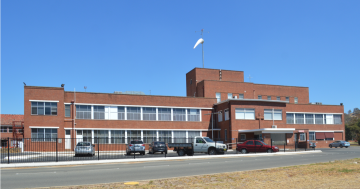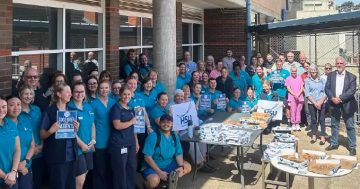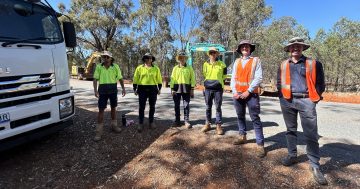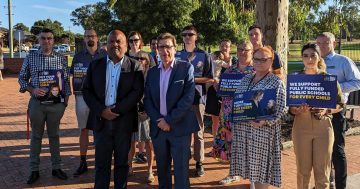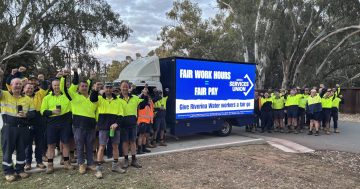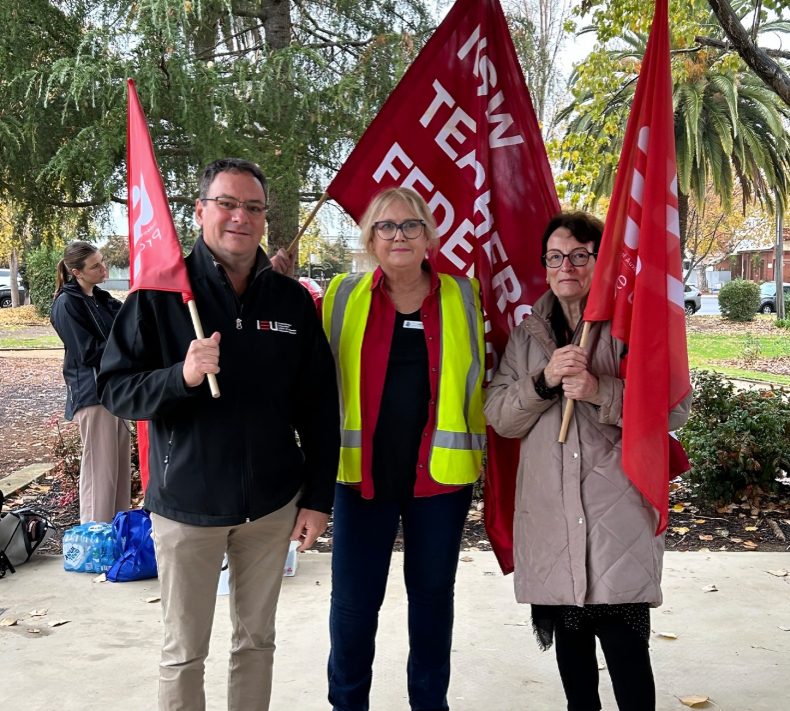
Independent Education Union of Australia organisers Anthony Telford, left, and Jackie Groom, right, with NSW Teachers Federation organiser Kelly Bowman, stood united with teachers, nurses and other essential workers to protest the changes to workers’ compensation in NSW. Photo: Independent Education Union of Australia.
Riverina essential workers have combined to protest proposed cuts to workers’ compensation by the NSW Government.
According to Unions NSW, the proposed cuts would drastically limit the mental health support offered to those who are injured on the job.
In a statement made by Unions NSW, the fears that essential workers have are based on the NSW Government’s proposal to:
- Require traumatised workers to undertake legal proceedings before accessing mental health care and support
- Implement a 30 per cent Whole Person Impairment threshold – Australia’s harshest – excluding 95 per cent of legitimate psychological injury claims from long-term support and care.
According to Unions NSW, the effects of these changes to workers’ compensation would be much greater for the people of the Riverina than for any other area.
A study conducted by Unions NSW found that 97 per cent of Riverina workers had experienced psychological hazards at work, while 62 per cent of Wagga Wagga frontline workers reported being exposed to trauma and traumatic events.
The study also found that 81 per cent of local workers believed the NSW Government’s Whole Person Impairment Index (or WPI, a measure of how injured a worker is) changes would force injured workers to return to work before it was safe for them to do so.
NSW Teachers Federation organiser Kelly Bowman criticised the NSW Treasurer’s decision to increase the WPI from 15 per cent to 31 per cent. The change would mean that in order to qualify for workers’ compensation, a worker would need to be incapable of completing almost one-third of their daily duties.
“The poorly drafted legislation that they’re attempting to bring to parliament, New South Wales, which is dressed up as reform, but it’s, it’s really a cost-cutting measure,” she said.
“The changes to the qualifications mean that out of 12,000 claims that are current, only 27 of those individuals would reach the bar, the new bar that they’ve drawn of 31 per cent impairment, which basically means you’re institutionalised.
“We had on a rainy, cold day, we had over 30 representatives there from many different workplaces across Wagga who were not on industrial action, so they had to hurry back to their workplace. They came out because they believe that this is wrong and that the legislation needs to be prevented.
Ms Bowman stated the severity of the changes would threaten workers’ mental health rights, stating it would set standards back decades.
“We are going back to a pre-21st Century position where people were ignorant about the harms caused by mental health,” she said.
“They’re removing those as identifiable hazards. They’re removing hazards like workload. They’re removing the incidence of close connection.
“For example, if there were a suicide in a school? If you are a teacher and you have taught that child for many years, you may have taught their siblings. You have developed relationships in the community with their families as well. This legislation is telling the teachers who taught the child who was involved in that unfortunate incident that they cannot make a claim for psychosocial harm.”
In April and this month, Unions NSW surveyed essential workers to understand the impact of the State Government’s proposed changes to the workers’ compensation system, which would make it more difficult for seriously injured workers to access mental health support and financial support.
More than 10,000 essential workers — including teachers, disability workers, firefighters, health services workers and emergency services personnel — responded to the survey. The results and accompanying testimonies showed workers overwhelmingly rejected the NSW government’s proposed changes, with many indicating they would be put at extreme risk of further harm or would face severe financial hardship if they were passed by parliament.









